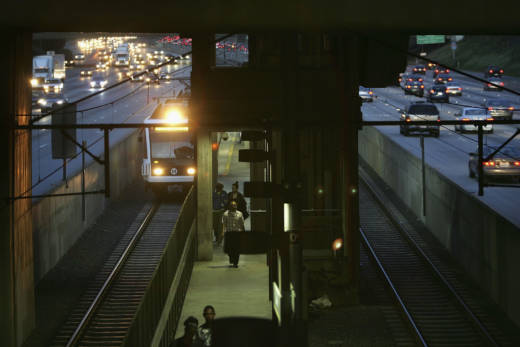A quick rundown of new California laws affecting vehicle owners, drivers, bridge users, parking-ticket payers, pedestrians and transit passengers:
- New fuel taxes and vehicle fees (SB 1): Higher fuel taxes included in the law, which aims to raise $52 billion over the next decade for road and bridge repair as well as highway and transit improvements, kicked in Nov. 1. A new “transportation improvement fee” of $25 to $175 — based on the value of a car or truck — will be added to vehicle registration fees as of Jan. 1, 2018. A new $100 fee for zero-emission vehicles will take effect in 2020. SB 1, and all its higher taxes and new fees, is currently the target of two recall campaigns.
- Bay Area bridge tolls (SB 595): The bill authorizes a vote on raising bridge tolls by as much as $3 in the nine Bay Area counties. The vote is expected to take place in June.
- Crosswalk countdowns (AB 390): The new law makes it legal to enter a crosswalk after a crosswalk countdown starts — as long as you get to the other side by the time the counter reaches zero. It’s important to note that another facet of previous state law remains unchanged: If you’re crossing at a traditional pedestrian signal — one without a countdown clock — it will remain illegal to start into the street once the flashing “don’t walk” (or red hand) begins flashing.
- Cannabis — no use in vehicles (SB 65): New law extends existing California ban on drinking alcohol while driving and while riding in a vehicle operating on a highway and now also prohibits “smoking or ingesting marijuana or any marijuana product while driving, or while riding as a passenger in, a motor vehicle being driven upon a highway or upon specified lands.”
- Cannabis — no open containers in vehicles (SB 94): Among the dozens of provisions of the legislation enacting the 2016 Adult Use of Marijuana Act is one that makes it illegal “to possess a receptacle containing cannabis or cannabis product that has been opened, or a seal broken, or to possess loose cannabis flower not in a container, while driving a motor vehicle, as specified, unless the receptacle is in the trunk of the vehicle or the person is a qualified patient carrying a current identification card or a physician’s recommendation and the cannabis or cannabis product is contained in a container or receptacle that is either sealed, resealed, or closed.”
- Driving passengers for hire — new DUI limit (AB 2687, 2016): A law taking effect July 1, 2018, extends the reduced blood-alcohol limits in place for truck and bus drivers to those who drive for Uber, Lyft and similar services. The law makes “it unlawful for a person who has 0.04 percent or more … of alcohol in his or her blood to drive a motor vehicle when a passenger for hire … is a passenger in the vehicle.”
- Parking tickets — payment plans for indigent drivers (AB 503): Creates a process that allows individuals with outstanding parking citations to repay their fines and penalties while preserving their ability to register and drive their vehicles.
- Disabled parking placards (SB 611) Via the Sacramento Bee: The new law “requires the state Department of Motor Vehicles to tighten its oversight of the state disabled placard program. That includes reviewing the federal Social Security Administration’s ‘death file’ and canceling placards of deceased drivers.”
- Parking tickets — no citations at broken meters (AB 1625): The new law prohibits local governments from prohibiting or
restricting parking at broken meters or payment devices. However, parking at broken meters is limited to posted time limits. - Bus seat belts (SB 20): Effective July 1, 2018, the bill requires bus drivers and passengers to wear seat belts in buses that are equipped with them and requires drivers to notify passengers of this requirement and the fine for not wearing a seat belt either before departure or with posted signs or placards.
- Motorcycle training courses (AB 1027): The new law allows the Department of Motor Vehicles to accept a certificate of completion of an approved motorcyclist training program in lieu of a driving test and specifies that people under 21 must complete a novice program.
- Transit fines (SB 614): The new law reduces fines for fare evasion and other passenger conduct offenses specified by state law (for instance, smoking, eating or playing loud music on trains or buses). The law also requires that low-income and minor riders be given the choice of community service in lieu of paying fines for such offenses.
- Testing autonomous vehicles (SB 719): You may not believe this, but California’s official rules of the road require a minimum of 100 feet of space between vehicles moving down the road. One of the promises of autonomous vehicles is the potential to operate closer together, in effect adding capacity to our existing highways. SB 719 provides for continued testing of “technologies that enable drivers to safely operate motor vehicles with less than 100 feet between each vehicle or combination of vehicles until January 1, 2020, and requires Caltrans to submit an updated report on the testing to the Legislature on or before July 1, 2019.”
